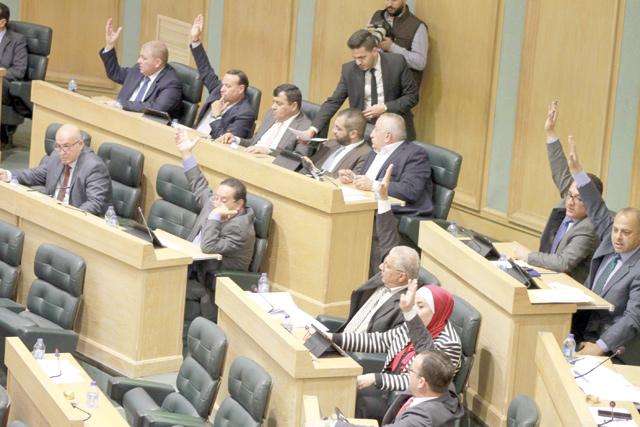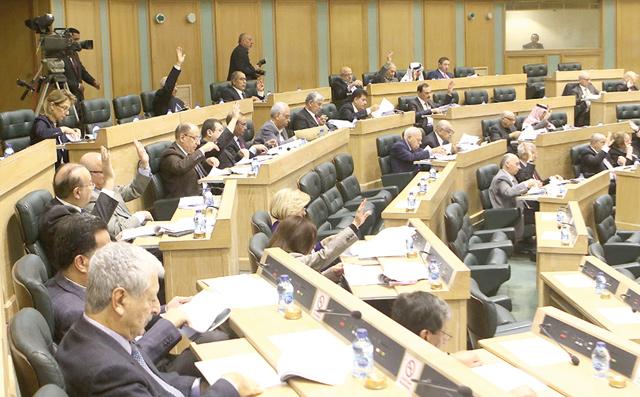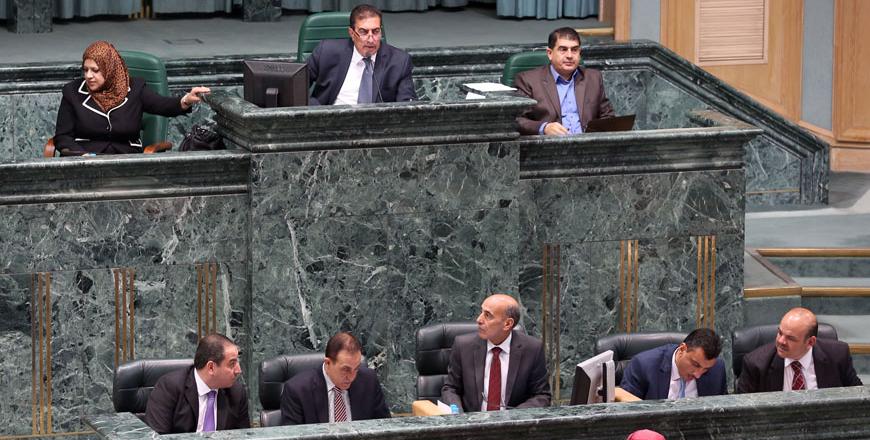You are here
House endorses medical accountability law
By JT - Apr 04,2018 - Last updated at Apr 04,2018

MPs vote as the Lower House ends a debate over medical malpractice law on Tuesday (Photo by Hassan Tamimi)
AMMAN — The Lower House on Tuesday endorsed the 2016 medical and health accountability draft law.
Under the bill, an insurance fund will be established, affiliated with the Higher Medical Council, to cover medical malpractice, obliging “establishments licensed to present medical and health services” to insure practitioners at their premises, the Jordan News Agency, Petra, reported.
Management of the fund and all relevant affairs are to be determined later through a bylaw.
The bill also stipulates that the Health Ministry should compile a database for licensed medical and health staff, and classify them according to their professional levels in coordination with their respective professional associations.
The ministry has to have in place a special register of medical mistakes that receive final judicial rulings, with the health minister tasked with issuing regulations determining what data, resolutions and rulings have to be listed in this record.
The information in the register will remain confidential and not disclosed except under cases specified in the law.
The draft law defines the medical mistake as “any act or omission by the service provider that deviates from accepted norms of practice within the work environment and causes an injury to the patient”.
MPs endorsed the illegality of ending the life of service recipients under any circumstances, even upon their own request or the request of their parents or caretakers.
Lawmakers also prohibited removing resuscitation devices unless the heart or breath stops completely or if all brain functions stop completely, according to medical standards and when doctors decide that such a condition is irreversible.
The draft law bans transferring service recipients from their places of treatment — with taking into consideration the special rules concerning communicable diseases — unless their condition allows such a measure or when they have to be transferred for purposes of continued treatment.
Patients can also be transferred upon their own request, provided they are sane and aware of the consequences of their dispatch, or upon a written approval by a doctor at the treatment place if the patient lacks competence, providing that a patient’s parent or caretaker approves the transfer.
No person is allowed to stay at the treatment place without a justification, the bill stipulates.
MPs also set as a condition, a written approval of the husband and wife when pregnancy aid technologies are applied, stressing that that embryos can be transplanted into women when the sperm is only obtained from the husband.
Under the draft law, it is illegal to carry out any act or medical intervention to sterilise females without their written approval and upon an opinion issued by a medical committee of specialists, except for emergency cases.
The bill stipulates a fine ranging between JD3,000 and JD5,000 for violating articles 6 and 7.
Article 6 lists the rules that service providers have to abide by, including compliance with rules and regulations, registering the health condition of patients and their medical history, determining treatment and its dose and methods of use, and informing patients of their medical conditions and level of danger involved.
Article 7 bans carrying out any act related to patient treatment without their consent, except in cases that require emergency intervention, when such approvals are impossible to obtain. The article also prohibits medics from refusing to treat patients, using unlicensed medicines or equipment, or prescribing medicines before clinical examination.
MPs also criminalised human cloning, research and experiments for cloning purposes and any female sterilisation with prison terms no less than five years and not exceeding10 years, and a fine ranging between JD10,000 and JD50,000.
A prison term of no less than six months and a fine of no less than JD1,000, or either, shall be issued against anyone who conducts medical research on humans without an official permit from relevant institutions.
Sex change surgeries are punishable with imprisonment terms ranging between three and 20 years.
The draft law allows doubling penalties and fines when the perpetrator of the medical mistake was under influence.
His Majesty King Abdullah has recently cited the potential enactment of the medical accountability bill as a major step in efforts to encourage medical tourism.
Related Articles
AMMAN — The Senate on Thursday insisted on its amendments to the medical and health accountability and the higher council for the youth draf
AMMAN — The Lower House on Tuesday reworded a provision in the draft medical accountability law, removing the phrase "non-extraordinary circ
AMMAN — The number of founding members of any political party should not be less than 150, under an article in the draft political parties l
















